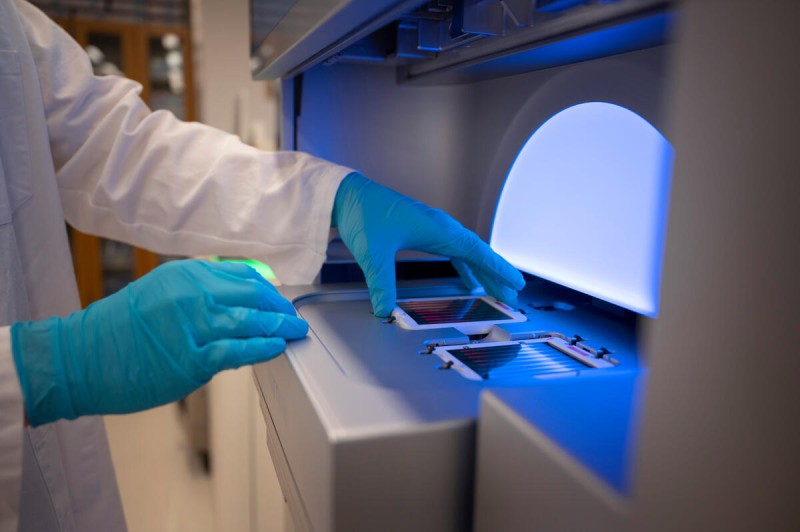
MSK-ACCESS® is a comprehensive liquid biopsy test developed by Memorial Sloan Kettering Cancer Center (MSK). The test offers noninvasive cancer genomic profiling and disease monitoring using cell-free DNA (cfDNA) obtained from blood and other body fluids.
What is MSK-ACCESS?
MSK-ACCESS (Analysis of Circulating cfDNA to Evaluate Somatic Status) provides ultra-deep sequencing of 146 key cancer-associated genes. These genes were selected from MSK’s genomic-profiling assay for solid tumors, called MSK-IMPACT® . They include therapeutically actionable and other frequently mutated regions of the genome.
Cell-free DNA sequencing relies on the principle that as tumor cells turn over, they release small amounts of tumor DNA into the bloodstream. This circulating tumor DNA (ctDNA) can be isolated and detected in the blood.
MSK-ACCESS was developed by the Marie-Josée and Henry R. Kravis Center for Molecular Oncology (CMO). The test was clinically validated and implemented by members of MSK’s Molecular Diagnostics Service and Clinical Computational Diagnostics Service. It received regulatory approval from the New York State Department of Health in 2019.
How does MSK-ACCESS work?
MSK-ACCESS was designed and optimized using data from more than 25,000 tumors that had already been sequenced with MSK-IMPACT.
MSK-ACCESS uses hybridization capture, molecular barcoding, and ultra-deep sequencing to identify low-frequency genomic alterations in cfDNA with very high sensitivity. Molecular barcodes are used to tag replicate sequence reads, which are merged to identify and eliminate sequencing errors and enable the detection of rare mutations.
The test was designed to include all genomic alterations that can be targeted with either an approved or investigational drug, including single nucleotide substitutions, small insertions and deletions, copy number alterations, selected rearrangements, and microsatellite instability.
In addition, by including white blood cell normal DNA, the test is able to identify and filter out germline variants and mutations related to clonal hematopoiesis.
A companion test for people with hematologic cancers such as lymphoma, MSK-ACCESS Heme, has also been validated and is being used to diagnose and monitor patients. That test evaluates 115 genes. Many of them are the same genes that are mutated in solid tumors.
Clinical interpretation of the variants identified by MSK-ACCESS is provided using OncoKB®, MSK’s knowledge base for matching patients with therapies based on their tumor sequencing results. OncoKB was recognized by the U.S. Food and Drug Administration in 2021. The results from MSK-ACCESS are also reviewed by MSK clinical bioinformaticians and pathologists.
MSK-ACCESS in clinical care
After MSK-ACCESS received approval for clinical use from the New York State Department of Health in 2019, it was launched for routine clinical diagnostics assessment. MSK-ACCESS has a wide variety of clinical applications, including noninvasive tumor genomic profiling, drug resistance characterization, disease monitoring, and surveillance.
Specifically, MSK-ACCESS testing can enable:
- Identification of driver mutations
- Matching of patients to approved targeted therapies and clinical trials
- Monitoring ctDNA levels and disease burden throughout treatment
- Characterizing tumor evolution and identifying acquired mutations that confer resistance to treatment
Since its launch, more than 10,000 patients with many types of solid tumors have had testing with MSK-ACCESS.
MSK-ACCESS in research
The MSK-ACCESS assay is available to researchers for profiling circulating tumor DNA derived from blood plasma and other body fluids. This testing is done as part of research projects conducted in the Integrated Genomics Operations (IGO) core facility at MSK.
Scientists in the CMO and IGO are using MSK-ACCESS data for a number of research studies.
The full potential of liquid biopsy assays such as MSK-ACCESS is still unfolding. The CMO, along with partners throughout MSK, is leading some of the most exciting explorations of its use.
Trials at MSK and elsewhere are studying whether liquid biopsy is an effective way to detect the early recurrence of cancer. Cell-free DNA is also being used in addition to radiographic imaging to more quantitatively assess response to targeted and immuno-oncology therapies.
Additionally, researchers are looking at ways to improve the test’s ability to solve a problem that has long vexed the field: how to find minimal residual disease or minute traces of cancer that remain after treatment and increase the risk that the disease will return.
Many researchers believe that liquid biopsy may even be the future of early detection, with tests that can be used to screen otherwise healthy people for the earliest signs of cancer.
MSK-ACCESS in publications
- Jee J, Brannon AR, Singh R, et al. DNA liquid biopsy-based prediction of cancer-associated venous thromboembolism. Nat Med. 2024 Sep;30(9):2499-2507. doi: 10.1038/s41591-024-03195-0.
- Choudhury NJ, Woo HJ, Chen M, et al. Serial Cell-Free DNA Sequencing in ROS1 Fusion-Positive Lung Cancers During Treatment With Entrectinib. JCO Precis Oncol. 2024 Jun:8:e2300721. doi: 10.1200/PO.23.00721.
- Harding JJ, Piha-Paul SA, Shah RH, et al. Antitumour activity of neratinib in patients with HER2-mutant advanced biliary tract cancers. Nat Commun. 2023 Feb 6;14(1):630. doi: 10.1038/s41467-023-36399-y.
- Rosen EY, Won HH, Zheng Y, et al. The evolution of RET inhibitor resistance in RET-driven lung and thyroid cancers. Nat Commun. 2022 Mar 18;13(1):1450. doi: 10.1038/s41467-022-28848-x.
- Brannon AR, Jayakumaran G, Diosdado M, et al. Enhanced specificity of clinical high-sensitivity tumor mutation profiling in cell-free DNA via paired normal sequencing using MSK-ACCESS®. Nat Commun. 2021 Jun 18;12(1):3770. doi: 10.1038/s41467-021-24109-5.



